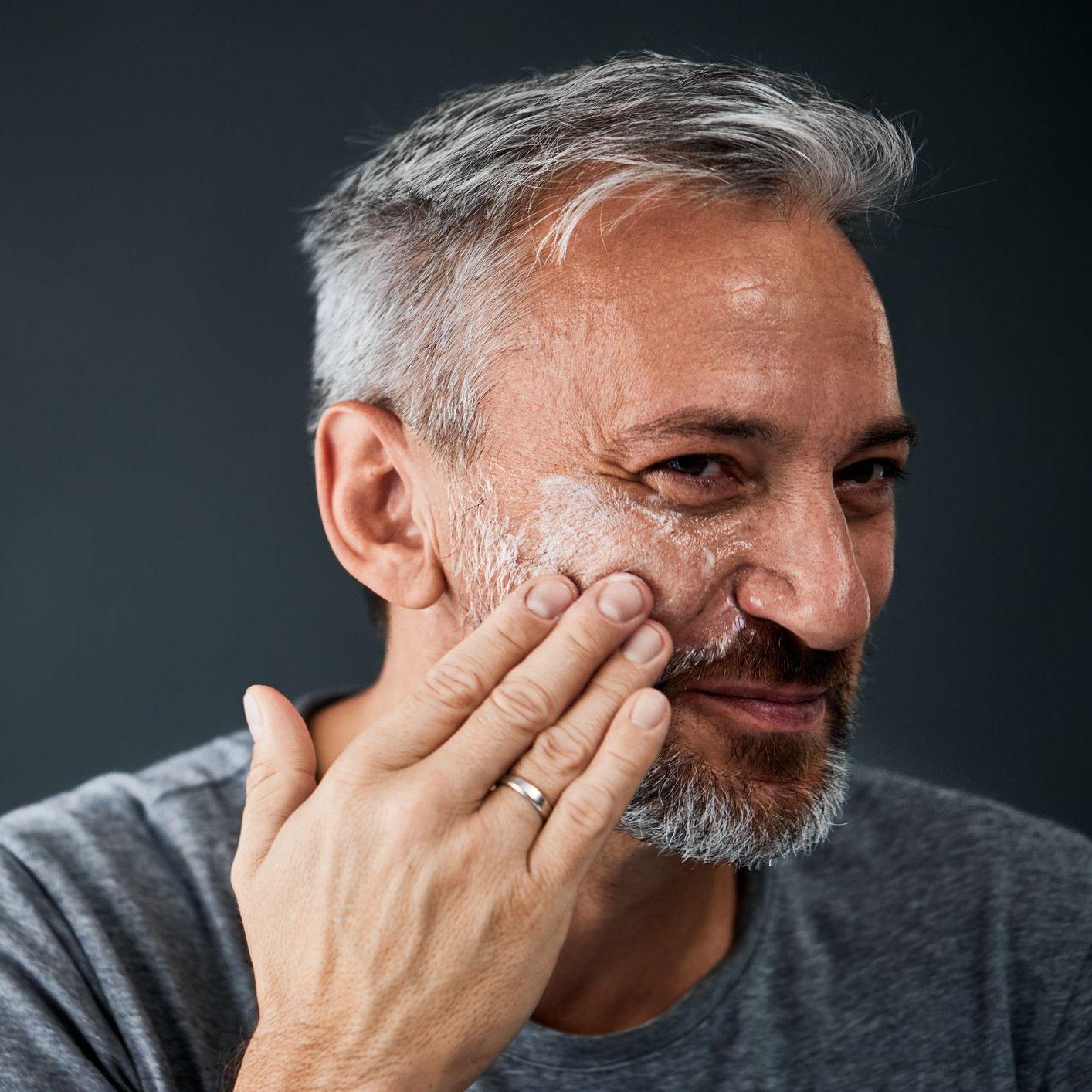November marks National Healthy Skin Month, making it the perfect time to explore one of the most overlooked factors in men's skin health: testosterone. While we often associate this hormone with muscle mass and energy, research reveals that testosterone plays a crucial role in everything from skin thickness to moisture retention and even healing capacity.

Understanding how testosterone and skin health are connected can help you make informed decisions about your skincare routine, lifestyle choices, and overall health approach, especially as hormone levels naturally decline with age.
The Testosterone-Skin Connection
Testosterone doesn't just influence what we traditionally think of as "masculine" traits. Research shows that this hormone has a profound impact on skin structure and function across multiple systems in the body.
Key ways testosterone affects your skin:
- Skin Thickness: Male skin is approximately 20% thicker than female skin, which could be due to testosterone's influence on collagen production and cellular turnover.
- Sebum Production: Testosterone stimulates sebaceous glands, leading to increased oil production. While this can contribute to acne in some men, it also provides natural moisture and protection.
- Barrier Function: Research indicates that testosterone actually has a negative effect on barrier function, making male skin more vulnerable to dryness and irritation despite higher oil production.
- Wound Healing: Interestingly, while male skin regenerates more quickly due to higher cellular turnover, wound healing occurs more slowly in men compared to women, partly due to testosterone's effects.
When Testosterone Declines: Visible Skin Changes

As testosterone levels naturally decrease with age, typically by 1.6% per year for total testosterone and 2-3% for free/bioavailable testosterone, men may notice several changes in their skin's appearance and behavior.
Testosterone and Dry Skin
Lower testosterone levels can contribute to decreased skin moisture and compromised barrier function. Research has shown that men with declining hormone levels often experience increased skin dryness, reduced elasticity, and thinner skin overall.
The relationship between testosterone and dry skin is complex. While testosterone increases oil production, it also affects the skin's ability to retain moisture at the cellular level. As levels drop, men may notice their skin feels tighter, looks duller, and becomes more prone to irritation.
Reduced Skin Density and Thickness
Research suggests that testosterone plays a key role in maintaining skin density. When levels decline, men may experience:
- Decreased skin firmness
- More visible fine lines and wrinkles
- Reduced skin resilience
- Slower recovery from minor injuries or irritation
Changes in Skin Repair and Protection
One of the most significant findings in testosterone research as it relates to skin has to do with skin protection and healing. Studies show that adequate testosterone levels help protect skin from ischemic damage and support better tissue repair through improved revascularization.
This means that maintaining healthy testosterone levels may help your skin recover more effectively from environmental damage, minor injuries, and daily wear.
The Vitamin D and Testosterone Connection

An often-overlooked aspect of skin health involves the relationship between vitamin D and testosterone. Your skin produces vitamin D when exposed to sunlight, and research suggests that adequate vitamin D levels support healthy testosterone production.
This creates an interesting dynamic: moderate sun exposure can boost vitamin D synthesis, potentially supporting testosterone levels, which in turn benefits skin health. However, excessive sun exposure damages skin, so finding the right balance is crucial.
Tips to support both vitamin D and testosterone:
- Get 10-15 minutes of morning sunlight daily
- Consider vitamin D supplementation if levels are low and if approved by your doctor
- Maintain adequate zinc and magnesium intake
Hormonal Breakouts
While we often think of acne as a teenage problem, hormonal breakouts can affect men throughout their lives, especially when testosterone levels fluctuate. In fact, research shows that testosterone-triggered sebum production can lead to clogged pores and bacterial overgrowth.
Hormonal breakouts typically occur when:
- Testosterone levels spike, increasing oil production
- DHT (dihydrotestosterone) levels rise, particularly affecting areas with more androgen receptors
- Stress elevates cortisol, which can interact with testosterone pathways
These breakouts often appear along the jawline, neck, and back, which are areas with higher concentrations of androgen receptors. Unlike typical acne, hormonal breakouts may be deeper, more painful, and take longer to heal.
The DHT Factor: When Testosterone Becomes Problematic
Not all testosterone effects on skin are beneficial. When testosterone converts to DHT (dihydrotestosterone), it can contribute to several skin concerns:
- Increased Acne: DHT stimulates sebaceous glands more powerfully than testosterone
- Hair Loss: DHT contributes to male pattern baldness by affecting hair follicles
- Skin Sensitivity: Higher DHT levels can increase skin reactivity and inflammation
Understanding this conversion helps explain why some men with normal testosterone levels still experience skin issues. The problem may lie in how efficiently their body converts testosterone to DHT.
Supporting Healthy Testosterone and Skin
Lifestyle Factors
- Exercise Regularly: Resistance training can help maintain healthy testosterone levels while improving circulation to the skin.
- Prioritize Sleep: Poor sleep quality can disrupt hormone production. Aim for 7-9 hours of quality sleep nightly.
- Manage Stress: Chronic stress elevates cortisol, which can suppress testosterone production and worsen skin conditions.
- Maintain Healthy Weight: Excess body fat, particularly around the midsection, can convert testosterone to estrogen and disrupt hormonal balance.
Nutritional Support
- Zinc: Essential for testosterone production and skin healing
- Vitamin D: Supports testosterone synthesis and skin cell function
- Omega-3 Fatty Acids: Help reduce inflammation and support skin barrier function
- Antioxidants: Protect both hormone-producing cells and skin cells from oxidative damage
Skincare Considerations
When testosterone levels are optimal, your skin care routine should account for increased oil production while supporting the skin's natural protective functions:

Morning Routine:
- Gentle cleanser to remove excess oil without over-drying
- Antioxidant serum (vitamin C) to protect against environmental damage
- Lightweight moisturizer with SPF
Evening Routine:
- Thorough cleansing to remove daily buildup
- Treatments targeting specific concerns (retinol for aging, salicylic acid for breakouts)
- Heavier moisturizer to support overnight repair
When to Seek Professional Help
Consider consulting a healthcare provider if you experience:
- Sudden changes in skin texture or oil production
- Persistent hormonal breakouts that don't respond to skincare
- Significant skin thinning or delayed healing
- Symptoms that may indicate hormonal imbalance (fatigue, mood changes, decreased libido)
Hormone testing can provide valuable insights into whether declining testosterone levels might be contributing to skin concerns.
Your Next Steps for Healthier Skin
Your skin's health is intricately connected to your hormone levels, particularly testosterone. As levels naturally decline with age, understanding this relationship empowers you to make informed decisions about skincare, lifestyle, and potential interventions.
During National Healthy Skin Month, consider your skin health from the inside out. Supporting healthy testosterone levels through lifestyle choices, proper nutrition, and stress management can have profound effects on your skin's appearance, resilience, and overall health.
If you're concerned about how changing hormone levels might be affecting your skin, consider getting baseline testing to understand where you stand. Knowledge is the first step toward taking control of both your hormonal health and your skin's long-term vitality.
Want more insights on men's health and hormones? Sign up for our newsletter to get expert tips delivered straight to your inbox.
.svg)


.svg)






